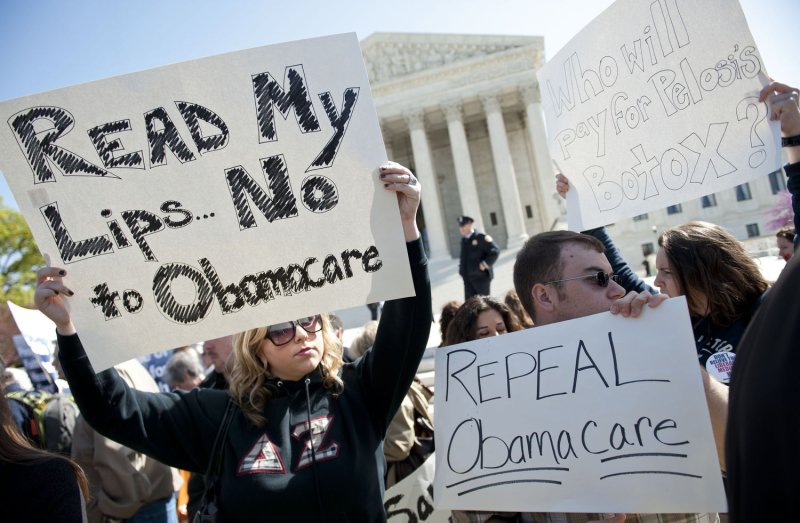1 of 2 | Protesters gather in front of the U.S. Supreme Court as the court begins hearing arguments on the constitutionality of the Patient Protection and Affordable Care Act in Washington, March 26, 2012. UPI/Kevin Dietsch |
License Photo
WASHINGTON, March 27 (UPI) -- Government attorneys came under pointed questioning Tuesday, indicating U.S. Supreme Court justices are skeptical of the healthcare law's individual mandate.
The issue is whether the Commerce Clause in the Constitution allows Congress to "create commerce where previously none existed," in this case forcing everyone who can afford to do so to buy health insurance or face a fine under the Patient Protection and Affordable Care Act.
Justice Samuel Alito asked Solicitor General Donald B. Verrilli Jr. if people are required to buy health insurance, why aren't they required to buy burial insurance. Chief Justice John Roberts wanted to know what makes emergency healthcare different from other emergency services, such as police and fire, in the second day of argument about the law's constitutionality.
"Well, one big difference, one big difference, Justice Alito, is the -- you don't have the cost shifting to other market participants," Verrilli said in one exchange.
"Sure you do," Alito responded, "because if you don't have money then the state is going to pay for it. Or some --"
"That's different," Verrilli interrupted.
"Or a family member is going to pay," Alito concluded.
"That's a difference and it's a significant difference," Verrilli explained near the beginning of the 2 hours of argument. "In this situation, one of the economic effects Congress is addressing is that the ... many billions of dollars of uncompensated costs are transferred directly to other market participants. It's transferred directly to other market participants because healthcare providers charge higher rates in order to cover the cost of uncompensated care, and insurance companies reflect those higher rates in higher premiums, which Congress found translates to a thousand dollars per family in additional health insurance costs."
In another exchange, Justice Antonin Scalia wanted to know if the federal government should be able to mandate that everyone buy broccoli.
"No, that's quite different. That's quite different. The food market, while it shares that trait that everybody's in it, it is not a market in which your participation is often unpredictable and often involuntary," Verrilli responded.
In another exchange Alito said if the cost of coverage were calculated for a group of people, "the cost of that policy would be much, much less than the kind of policy that these people are now going to be required to purchase under the Affordable Care Act?"
"Well, while they are young and healthy that would be true. But they are not going to be young and healthy forever," Verrilli said.
Roberts also said he fears if the mandate is declared constitutional, it could be expanded to other areas, something Verrilli denied, saying the law is narrowly drawn to just apply to the method of payment for healthcare consumption.
Paul D. Clement, who argued on behalf of the 26 states objecting to the mandate, said requiring people to buy health insurance is an "unprecedented effort by Congress to compel individuals to enter commerce in order to better regulate commerce. The Commerce Clause gives Congress the power to regulate existing commerce. It does not give Congress the far greater power to compel people to enter commerce to create commerce essentially in the first place."
But Justice Ruth Bader Ginsburg compared the controversy over the mandate to the creation of Social Security, which ran into objections at its inception as well. Clement argued the situations are different and the government would be far better off calculating how much of a tax it would take to subsidize the healthcare industry and spread that subsidy evenly.
"That's the way we pay for most subsidies," he said.
Michael A. Carvin, representing business interests, said the individual mandate forces people "for paternalistic purposes" into the insurance market.
"So regardless of whether it has beneficial downstream effects, we must say no, Congress doesn't have that power. Why not? Because everything has downstream effects on commerce and every compelled purchase promotes commerce," Carvin said.
In arguments Monday, the justices indicated they are willing to ignore the Anti-Injunction Act and consider the constitutionality of the healthcare law now rather than waiting for all of its provisions to become effective in 2014.
The final day of argument Wednesday concerns whether parts of the law can survive if some of its provisions are struck down and whether the law's expansion of Medicaid is legal.















